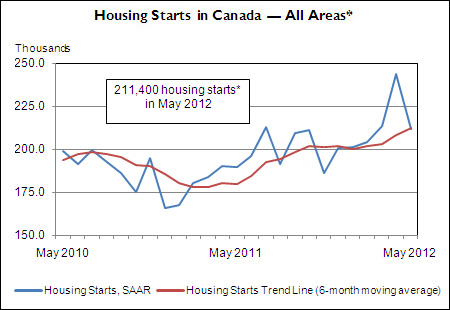OTTAWA, June 8, 2012 — The number of housing starts was trending at 212,400 units in May, according to Canada Mortgage and Housing Corporation (CMHC). The trend is a moving average of the monthly seasonally adjusted annual rates (SAAR)1 of housing starts. The standalone monthly SAAR was 211,400 units in May, down from 243,800 in April.
“As anticipated, the pace of housing starts observed in April was not sustained in May. In fact, the pace in May was more in line with the average over the last six months,” said Mathieu Laberge, Deputy Chief Economist at CMHC’s Market Analysis Centre. “Although some ups and downs are likely to continue in the months ahead, the pace of housing starts should trend lower as the year progresses,” added Laberge.
For some markets, CMHC uses the trend measure as a complement to the monthly SAAR of housing starts to account for considerable swings in monthly estimates and obtain a more complete picture of the state of the housing market. Analysing only SAAR data can be misleading in some markets in some situations, as they are largely driven by the multiples segment of the markets which can be quite volatile from one month to the next.
The seasonally adjusted annual rate of urban starts decreased by 15.8 per cent to 189,600 units in May. Urban single starts decreased by 4.2 per cent in May to 64,300 units, while multiple urban starts decreased by 20.7 per cent to 125,300 units.
May’s seasonally adjusted annual rate of urban starts decreased by 35.8 per cent in Québec, by 18.3 per cent in Ontario, and by 7.7 per cent in the Prairies. Urban starts increased by 6.4 per cent in Atlantic Canada and by 20.9 per cent in British Columbia. In each region, the decrease or increase was mainly due to changes in multiple starts.
Rural starts2 were estimated at a seasonally adjusted annual rate of 21,800 units in May.
As Canada’s national housing agency, CMHC draws on more than 65 years of experience to help Canadians access a variety of high quality, environmentally sustainable and affordable housing solutions. CMHC also provides reliable, impartial and up-to-date housing market reports, analysis and knowledge to support and assist consumers and the housing industry in making informed decisions.
1All starts figures in this release, other than actual starts and the trend estimate, are seasonally adjusted annual rates (SAAR) — that is, monthly figures adjusted to remove normal seasonal variation and multiplied by 12 to reflect annual levels. By removing seasonal ups and downs, seasonal adjustment allows for a comparison from one season to the next and from one month to the next. Reporting monthly figures at annual rates indicates the annual level of starts that would be obtained if the monthly pace was maintained for 12 months. This facilitates comparison of the current pace of activity to annual forecasts as well as to historical annual levels.
2 CMHC estimates the level of starts in centres with a population of less than 10,000 for each of the three months of the quarter, at the beginning of each quarter. During the last month of the quarter, CMHC conducts the survey in these centres and revises the estimate.


| Actual | SAAR | |||
|---|---|---|---|---|
| May 2011 |
May 2012 |
April 2012 |
May 2012 |
|
| Source: CMHC *Seasonally adjusted annual rates **Urban centres with a population of 10,000 and over. Detailed data available upon request. |
||||
| Revised | Preliminary | Revised | Preliminary | |
| Canada, all areas | 18,292 | 19,264 | 243,800 | 211,400 |
| Canada, rural areas | 2,330 | 2,206 | 18,700 | 21,800 |
| Canada, urban centres** | 15,962 | 17,058 | 225,100 | 189,600 |
| Canada, singles, urban centres | 6,335 | 6,145 | 67,100 | 64,300 |
| Canada, multiples, urban centres | 9,627 | 10,913 | 158,000 | 125,300 |
| Atlantic region, urban centres | 930 | 866 | 7,800 | 8,300 |
| Quebec, urban centres | 4,525 | 3,601 | 55,300 | 35,500 |
| Ontario, urban centres | 5,033 | 6,604 | 94,600 | 77,300 |
| Prairie region, urban centres | 2,957 | 3,700 | 45,400 | 41,900 |
| British Columbia, urban centres | 2,517 | 2,287 | 22,000 | 26,600 |
![]()





![[small-rates-logo-alt]](http://www.ratehub.ca/images/logo-small-right.png)

.png)
.png)



Posted by Theo Wu